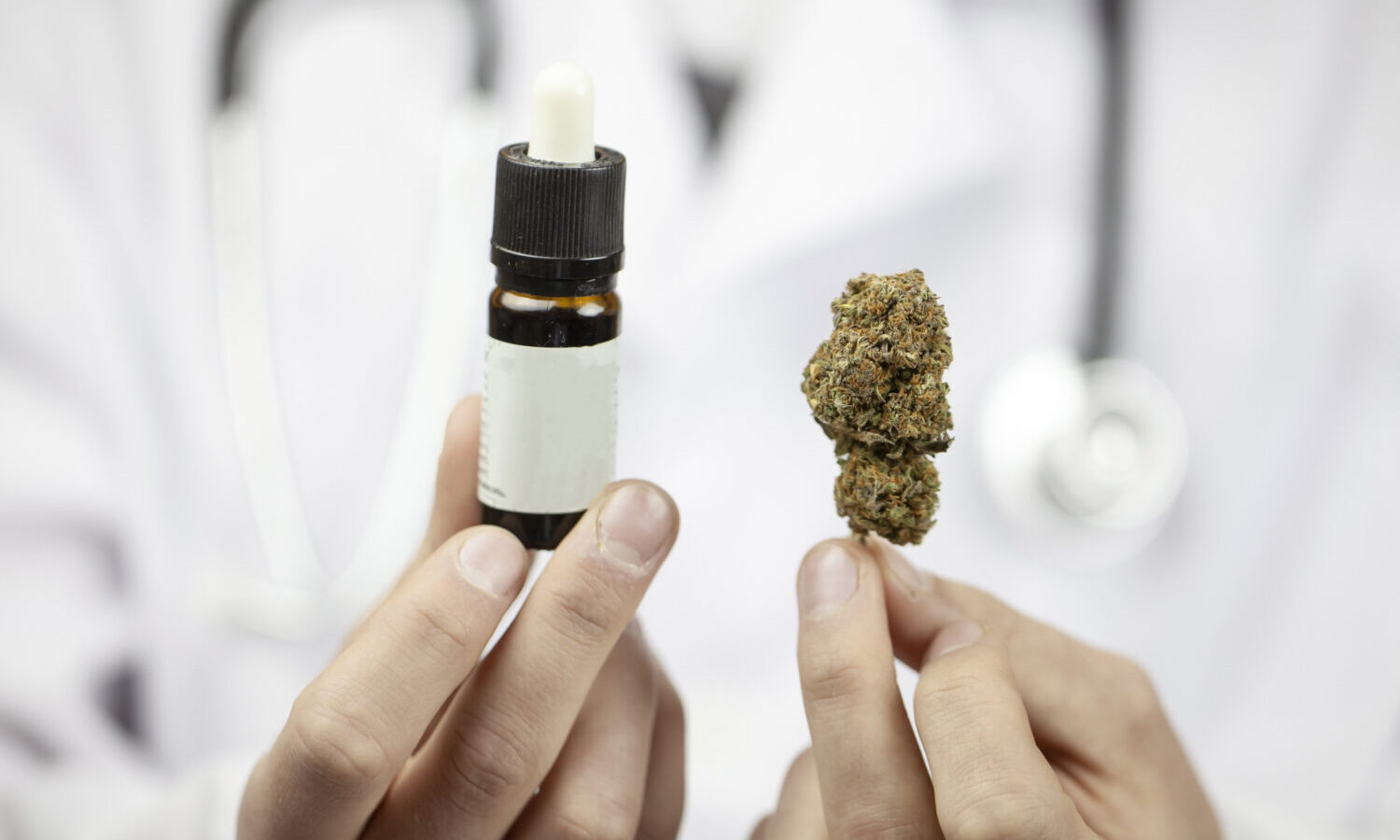Business
Cannabis Is Beneficial For Patients With Advanced Cancer, Finds Latest Medical Studies

Current studies on marijuana for cancer are hopeful, and patients who want to explore using cannabis for cancer are recommended to talk to their doctors.
The big C has a tremendous impact on society and families around the world. According to the Centers for Disease Control and Prevention, there were over 1,750,000 new cancer cases in 2019 alone, and around a third of those patients died from cancer.
Unfortunately, there is still no known cancer cure, though the evolution of medical technology continues to save more lives. But cancer patients, along with their families, still have to face hardships: treatment with side effects, expensive and addictive medications for pain, poor quality of life, and emotional anguish. But perhaps cannabis can make things a little simpler.
Researchers from the Upstate University Hospital in Syracuse sought out to analyze how patients with advanced cancer responded to medical marijuana treatment.
Participants for the study were enrolled in New York’s MMJ registry. “The goals of this study were to review the characteristics of patients who received medical marijuana under our ambulatory palliative care program and to determine barriers to access and use of medical marijuana in this population,” says the study.

“Data from June 2017 to June 2020 were analyzed. Patients were included if they had a diagnosis of cancer, were certified by a qualified practitioner in the New York Medical Marijuana Program, and received care at Upstate Medical University,” it reads. “Patients were excluded if no marijuana certificate was found or if they transferred care.”
The researchers found that advanced cancer patients who used medical cannabis had positive effects. “Ninety-three patients (51.5%) received at least one prescription from a New York licensed marijuana dispensary while 72 (39.13%) were certified but never obtained any medical marijuana,” they wrote. “For patients who took at least one dose of medical marijuana, 48.14% experienced an improvement in pain, 44.95% used fewer opioids, and 85.11% had an improvement in at least one symptom. Adverse effects were low at 3.72%.,” says the study.
The research adds that “medical marijuana appears to have an important role in palliating symptoms of advanced cancers with few adverse effects.” The researchers also called on more studies to determine optimal dose and delivery for patients.
Cannabis For Cancer Treatment Is Promising
There’s still much that even experts are unsure of when it comes to understanding how cannabis can help with cancer. Several other aspects can make it slightly more complicated, such as the cannabinoids used and the kind of cancer.
In another recent study out of Israel, researchers assessed the cancer symptoms of several hundred patients over the course of 6 months. They found statistical improvements in symptoms and a significant decrease in their need for painkillers.
The researchers concluded that cannabis was associated with reduction in cancer symptoms, reduction of prescription drug consumption, and better quality of life. Almost half of the cancer patients who finished the trials no longer needed painkillers. “The main finding of the current study is that most cancer comorbid symptoms improved significantly during six months of MC [medical cannabis] treatment…. Additionally, we found that MC treatment in cancer patients was well tolerated and safe.”
There are also over 100 natural cannabinoids that we all need to learn about, which means that there is no one-size fits-all approach in using cannabis for cancer treatment.
The American Cancer Society acknowledges that THC and CBD have the ability to cause cancer cell death or slow the growth of cancer cells. They may also prevent cancer from spreading. They base it on early clinical trials in humans. “While the studies so far have shown that cannabinoids can be safe in treating cancer, they do not show that they help control or cure the disease,” they say. Certainly more research is needed to maximize the therapeutic ability of cannabis, though there have been many anecdotal cases of individuals saying that cannabis has helped treat their cancer.

There are several studies that support the therapeutic properties of cannabinoids for cancer patients. In fact, cancer patients can benefit in several ways from using cannabis:
- Managing the side effects of chemotherapy and radiation: Chemo and radiation are among the most common and successful conventional treatments for cancer. However, they can produce several uncomfortable side effects such as nausea, pain, and loss of appetite. Many patients also struggle to finish chemotherapy and radiation treatments due to the discomfort it causes.
Cannabis has been shown to be successful in helping cancer patients manage these conditions: it reduces nausea, improves appetite, mitigates pain, and helps improve sleep. All of these are critical for healing. In addition, several studies have shown that using cannabis together with chemotherapy greatly improves prognosis.
- Cannabis can kill cancer cells without affecting healthy cells. Whereas chemotherapy also kills off healthy cells in the process, cannabis doesn’t. In one laboratory study, cancer researcher Dr. Matt Dun worked together with Australian Natural Therapeutics Group (ANTG) to come up with a marijuana variety with under 1% THC and high CBD. They found that this combination was effective for killing cancer cells.
“The CBD variety looks to have greater efficacy, low toxicity and fewer side-effects, which potentially makes it an ideal complementary therapy to combine with other anti-cancer compounds,” says Dr. Dun.
Conclusion
Current studies on marijuana for cancer are hopeful, and patients who want to explore using cannabis for cancer are recommended to talk to their doctors. They may be able to provide a dosage and consumption method that is best suited for your specific medical needs.
Business
New Mexico cannabis operator fined, loses license for alleged BioTrack fraud

New Mexico regulators fined a cannabis operator nearly $300,000 and revoked its license after the company allegedly created fake reports in the state’s traceability software.
The New Mexico Cannabis Control Division (CCD) accused marijuana manufacturer and retailer Golden Roots of 11 violations, according to Albuquerque Business First.
Golden Roots operates the The Cannabis Revolution Dispensary.
The majority of the violations are related to the Albuquerque company’s improper use of BioTrack, which has been New Mexico’s track-and-trace vendor since 2015.
The CCD alleges Golden Roots reported marijuana production only two months after it had received its vertically integrated license, according to Albuquerque Business First.
Because cannabis takes longer than two months to be cultivated, the CCD was suspicious of the report.
After inspecting the company’s premises, the CCD alleged Golden Roots reported cultivation, transportation and sales in BioTrack but wasn’t able to provide officers who inspected the site evidence that the operator was cultivating cannabis.
In April, the CCD revoked Golden Roots’ license and issued a $10,000 fine, according to the news outlet.
The company requested a hearing, which the regulator scheduled for Sept. 1.
At the hearing, the CCD testified that the company’s dried-cannabis weights in BioTrack were suspicious because they didn’t seem to accurately reflect how much weight marijuana loses as it dries.
Company employees also poorly accounted for why they were making adjustments in the system of up to 24 pounds of cannabis, making comments such as “bad” or “mistake” in the software, Albuquerque Business First reported.
Golden Roots was fined $298,972.05 – the amount regulators allege the company made selling products that weren’t properly accounted for in BioTrack.
The CCD has been cracking down on cannabis operators accused of selling products procured from out-of-state or not grown legally:
- Regulators alleged in August that Albuquerque dispensary Sawmill Sweet Leaf sold out-of-state products and didn’t have a license for extraction.
- Paradise Exotics Distro lost its license in July after regulators alleged the company sold products made in California.
Golden Roots was the first alleged rulebreaker in New Mexico to be asked to pay a large fine.
Source: https://mjbizdaily.com/new-mexico-cannabis-operator-fined-loses-license-for-alleged-biotrack-fraud/
Business
Marijuana companies suing US attorney general in federal prohibition challenge

Four marijuana companies, including a multistate operator, have filed a lawsuit against U.S. Attorney General Merrick Garland in which they allege the federal MJ prohibition under the Controlled Substances Act is no longer constitutional.
According to the complaint, filed Thursday in U.S. District Court in Massachusetts, retailer Canna Provisions, Treevit delivery service CEO Gyasi Sellers, cultivator Wiseacre Farm and MSO Verano Holdings Corp. are all harmed by “the federal government’s unconstitutional ban on cultivating, manufacturing, distributing, or possessing intrastate marijuana.”
Verano is headquartered in Chicago but has operations in Massachusetts; the other three operators are based in Massachusetts.
The lawsuit seeks a ruling that the “Controlled Substances Act is unconstitutional as applied to the intrastate cultivation, manufacture, possession, and distribution of marijuana pursuant to state law.”
The companies want the case to go before the U.S. Supreme Court.
They hired prominent law firm Boies Schiller Flexner to represent them.
The New York-based firm’s principal is David Boies, whose former clients include Microsoft, former presidential candidate Al Gore and Elizabeth Holmes’ disgraced startup Theranos.
Similar challenges to the federal Controlled Substances Act (CSA) have failed.
One such challenge led to a landmark Supreme Court decision in 2005.
In Gonzalez vs. Raich, the highest court in the United States ruled in a 6-3 decision that the commerce clause of the U.S. Constitution gave Congress the power to outlaw marijuana federally, even though state laws allow the cultivation and sale of cannabis.
In the 18 years since that ruling, 23 states and the District of Columbia have legalized adult-use marijuana and the federal government has allowed a multibillion-dollar cannabis industry to thrive.
Since both Congress and the U.S. Department of Justice, currently headed by Garland, have declined to intervene in state-licensed marijuana markets, the key facts that led to the Supreme Court’s 2005 ruling “no longer apply,” Boies said in a statement Thursday.
“The Supreme Court has since made clear that the federal government lacks the authority to regulate purely intrastate commerce,” Boies said.
“Moreover, the facts on which those precedents are based are no longer true.”
Verano President Darren Weiss said in a statement the company is “prepared to bring this case all the way to the Supreme Court in order to align federal law with how Congress has acted for years.”
While the Biden administration’s push to reschedule marijuana would help solve marijuana operators’ federal tax woes, neither rescheduling nor modest Congressional reforms such as the SAFER Banking Act “solve the fundamental issue,” Weiss added.
“The application of the CSA to lawful state-run cannabis business is an unconstitutional overreach on state sovereignty that has led to decades of harm, failed businesses, lost jobs, and unsafe working conditions.”
Business
Alabama to make another attempt Dec. 1 to award medical cannabis licenses

Alabama regulators are targeting Dec. 1 to award the first batch of medical cannabis business licenses after the agency’s first two attempts were scrapped because of scoring errors and litigation.
The first licenses will be awarded to individual cultivators, delivery providers, processors, dispensaries and state testing labs, according to the Alabama Medical Cannabis Commission (AMCC).
Then, on Dec. 12, the AMCC will award licenses for vertically integrated operations, a designation set primarily for multistate operators.
Licenses are expected to be handed out 28 days after they have been awarded, so MMJ production could begin in early January, according to the Alabama Daily News.
That means MMJ products could be available for patients around early March, an AMCC spokesperson told the media outlet.
Regulators initially awarded 21 business licenses in June, only to void them after applicants alleged inconsistencies with how the applications were scored.
Then, in August, the state awarded 24 different licenses – 19 went to June recipients – only to reverse themselves again and scratch those licenses after spurned applicants filed lawsuits.
A state judge dismissed a lawsuit filed by Chicago-based MSO Verano Holdings Corp., but another lawsuit is pending.
Source: https://mjbizdaily.com/alabama-plans-to-award-medical-cannabis-licenses-dec-1/
-

 Business2 years ago
Business2 years agoPot Odor Does Not Justify Probable Cause for Vehicle Searches, Minnesota Court Affirms
-

 Business2 years ago
Business2 years agoNew Mexico cannabis operator fined, loses license for alleged BioTrack fraud
-

 Business2 years ago
Business2 years agoAlabama to make another attempt Dec. 1 to award medical cannabis licenses
-

 Business2 years ago
Business2 years agoWashington State Pays Out $9.4 Million in Refunds Relating to Drug Convictions
-

 Business2 years ago
Business2 years agoMarijuana companies suing US attorney general in federal prohibition challenge
-

 Business2 years ago
Business2 years agoLegal Marijuana Handed A Nothing Burger From NY State
-

 Business2 years ago
Business2 years agoCan Cannabis Help Seasonal Depression
-

 Blogs2 years ago
Blogs2 years agoCannabis Art Is Flourishing On Etsy













